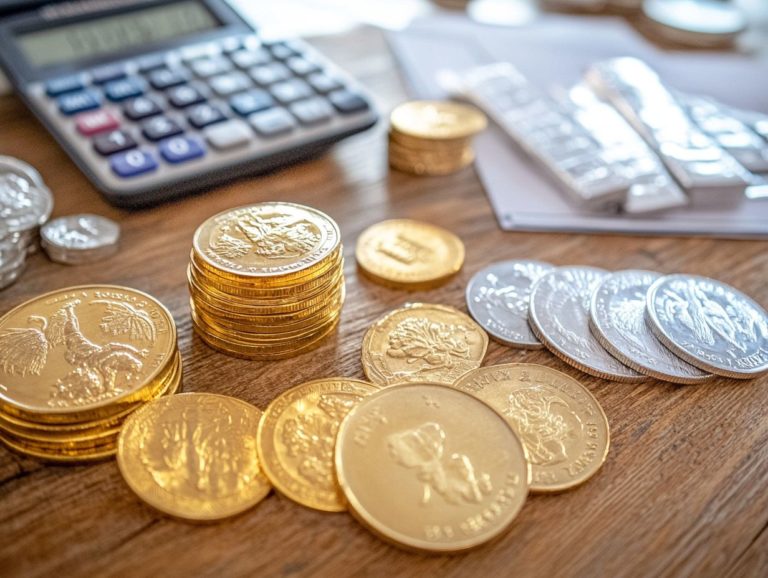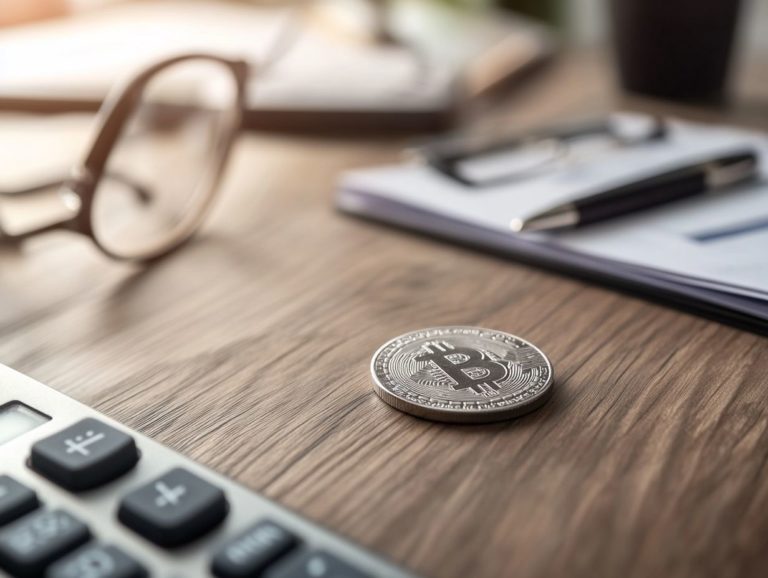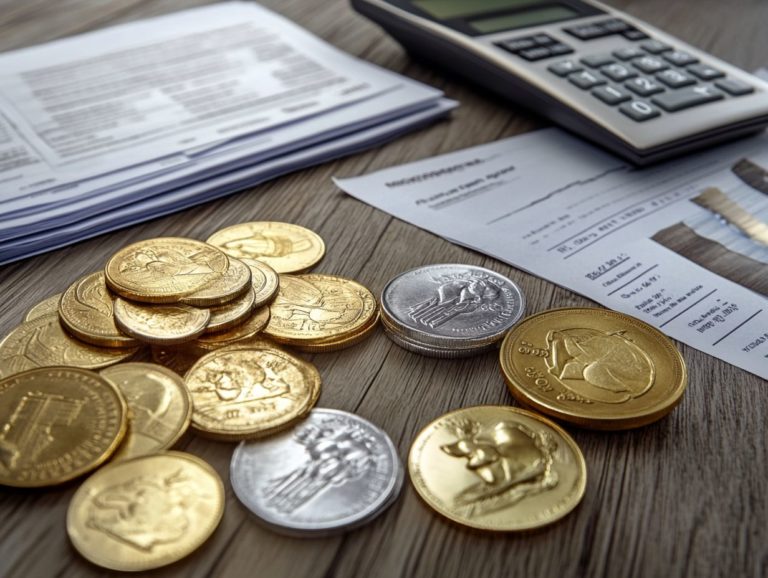Tax Implications of Transferring Precious Metals
Transferring precious metals can be challenging, especially with tax implications involved.
Whether selling, managing an inheritance, or giving a gift, understanding capital gains, inheritance, and gift taxes is essential.
Strategically timing your transfers and leveraging trusts or LLCs can significantly reduce your tax liability.
It’s also important to maintain meticulous records and ensure you have adequate insurance.
This article guides you through the key considerations related to transferring precious metals, equipping you to navigate these complexities with confidence.
Contents
- Key Takeaways:
- Overview of Transferring Precious Metals
- Tax Implications for Transferring Precious Metals
- Strategies for Minimizing Tax Liability
- Other Considerations for Transferring Precious Metals
- Frequently Asked Questions
- What are the tax implications of transferring precious metals?
- Do I have to pay taxes when transferring precious metals to another person?
- Are there any exemptions for transferring precious metals without incurring taxes?
- Do I need to report the transfer of precious metals on my tax return?
- What happens if I transfer precious metals internationally?
- Can I transfer precious metals into a retirement account without incurring taxes?
Key Takeaways:
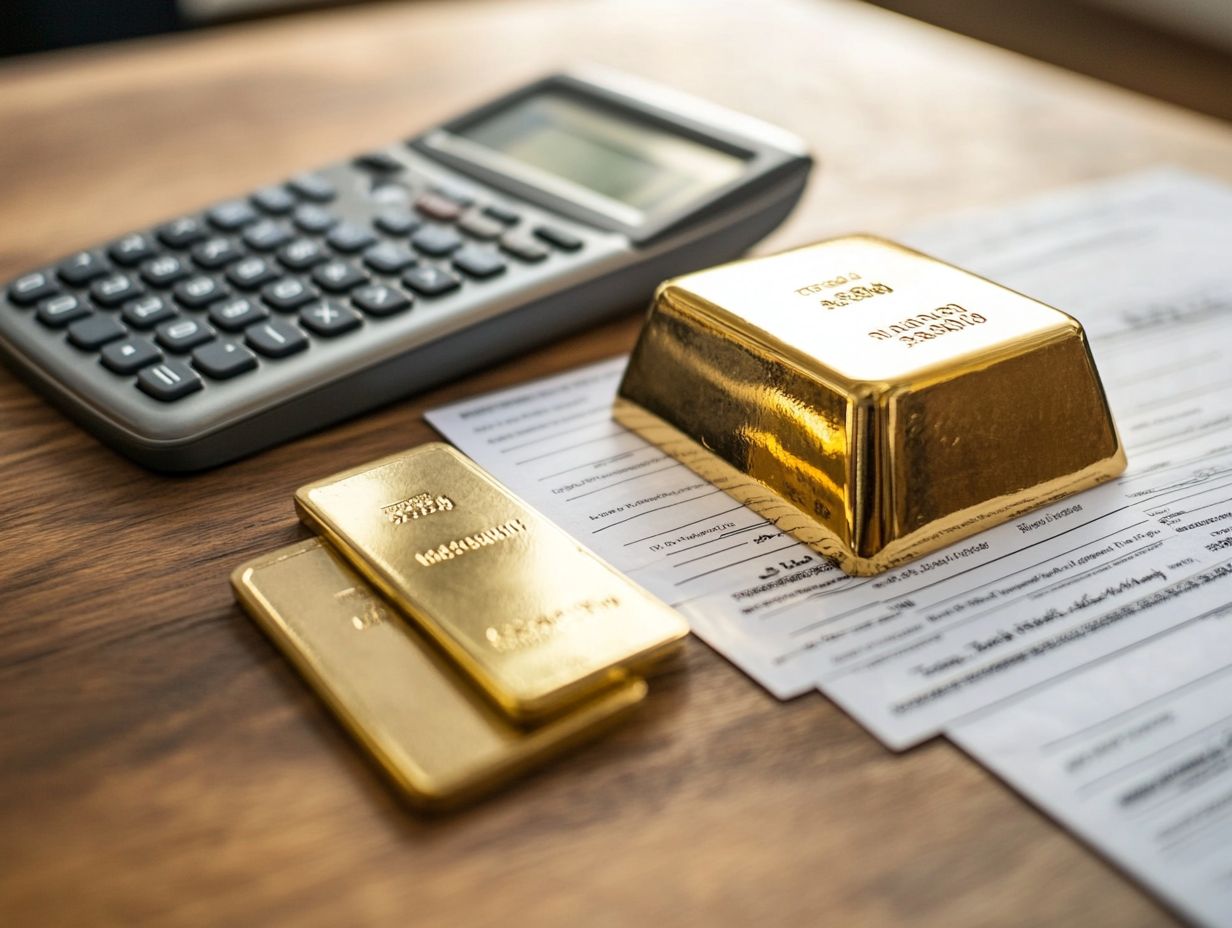
- Transferring precious metals may trigger capital gains, inheritance, or gift taxes, which vary based on the value and timing of the transfer.
- Strategies like timing the transfer, using trusts or LLCs, and consulting a tax professional can help minimize tax liability.
- Proper record-keeping, reporting, and insurance coverage are vital for successfully transferring precious metals.
Overview of Transferring Precious Metals
Transferring precious metals like gold, silver, and platinum can be intricate due to various tax regulations and strategies that can enhance your investment’s potential.
Understanding the implications of these transfers is critical, particularly if you’re acquiring physical assets or considering a Precious Metals IRA for retirement.
Collaborating with a financial advisor can significantly ease your journey through the IRS’s complex rules regarding capital gains tax and related obligations, ensuring your decisions align with your financial goals.
What is Precious Metal Transfer?
Precious metal transfer involves shifting ownership of physical assets like gold, silver, and platinum from one party to another, with various legal and financial considerations.
You may initiate this process for reasons such as diversifying your investments, securing your wealth, or planning your estate.
When transferring ownership, you typically navigate a structured procedure including assessments, appraisals, and necessary paperwork to comply with regulatory requirements.
Financial advisors become essential allies in guiding you through the complexities of the transfer while advising on market conditions, potential risks, and tax implications.
Grasping the nuances of precious metal transfers is vital for investors looking to leverage these assets as a strategic hedge against economic volatility or inflation.
Tax Implications for Transferring Precious Metals
Understanding the tax implications of transferring precious metals is crucial for investors, as it significantly influences your taxable income and overall investment returns.
The IRS has established guidelines regarding capital gains tax, which can vary based on factors like the holding period and the type of transfer.
It’s vital to understand how these regulations apply to your investments, allowing you to make informed decisions and optimize your financial outcomes.
Capital Gains Tax
Capital gains tax is an essential consideration for you as an investor in precious metals. It dictates the tax liability you incur when selling or transferring these assets based on how much the value of your assets has increased.
Understanding the distinctions between long-term and short-term capital gains tax rates is vital. They can significantly influence the overall profitability of your investments. Short-term capital gains apply to assets held for one year or less and are usually taxed at ordinary income tax rates, which can be hefty, depending on your income bracket.
On the other hand, long-term capital gains apply to assets held for more than a year. They come with reduced tax rates, making them a more favorable option for your financial strategy.
Consider this: if you sell gold coins after just six months of ownership, you may face a steeper tax burden than if you had held onto those coins for two years, when a lower tax rate might apply. Understanding the importance of tax withholding for precious metals helps you make smarter financial decisions, enabling you to minimize your tax obligations and enhance your investment returns.
Inheritance Tax

When transferring precious metals as part of an estate, grasping the intricacies of inheritance tax is essential. It can profoundly influence the net gains passed on to your heirs. Without careful planning, the value of these assets may shrink under the weight of tax liabilities, resulting in unanticipated consequences for your beneficiaries.
Estate taxes can add another layer of complexity, imposing additional burdens during the transfer process. This underscores the importance of engaging in proactive financial planning.
Consider various strategies, such as:
- gifting metals while you’re still around,
- utilizing trusts (legal arrangements to manage your assets),
- or exploring tax implications of precious metals gifts.
By implementing these tactics, you can mitigate the impact of tax obligations and ensure a more favorable outcome for future generations, effectively safeguarding your financial legacy.
Gift Tax
Gift tax considerations are paramount when you’re looking to transfer precious metals to family members or friends. The IRS has specific limits on the value of gifts that can be transferred tax-free each year.
Grasping these implications is essential for anyone engaged in such transfers. The annual exclusion amount can fluctuate year to year. If the value of your gift exceeds this threshold, you’ll need to file a gift tax return, which might lead to tax liabilities if your cumulative gifts surpass the lifetime exemption.
There are specific reporting requirements to follow to maintain compliance and steer clear of penalties. Proper financial planning is crucial to navigate these complexities, ensuring that your transfers are executed seamlessly while maximizing the benefits of available exemptions.
Strategies for Minimizing Tax Liability
To minimize your tax liability during the transfer of precious metals, consider employing a range of sophisticated strategies. This includes careful timing of the transfer, leveraging trusts or LLCs, and collaborating with a knowledgeable financial advisor who can guide you through the intricacies of the process.
By taking these steps, you can optimize your financial outcomes and ensure a smoother transition.
Timing of Transfer
The timing of your transfer can have a profound impact on your tax liability, especially when considering market fluctuations and your personal financial circumstances.
Understanding the market’s ups and downs is crucial for anyone aiming to optimize their precious metal transfers. When prices soar, the likelihood of capital gains taxes rises. This prompts you to think about deferring sales until you reach a lower tax bracket or employing strategies like tax-loss harvesting. Additionally, consider the role of precious metals in tax-deferred accounts to enhance your investment strategy.
Keeping an eye on economic indicators, such as interest rates and inflation, can help you determine the best moments to enter or exit the market. By planning strategically and consulting a financial advisor, you can effectively manage your transactions to reduce tax burdens while enhancing your overall financial outcome.
Don t wait to plan your transfers; acting now can save you money later!
Using Trusts or LLCs
Using trusts or LLCs to transfer precious metals provides significant tax benefits and strong asset protection. This strategy is ideal for smart investors.
By creating these entities, you can lower your taxable income and reduce taxes on profits from selling assets. Trusts allow for smooth transfers to heirs without immediate tax liabilities.
LLCs offer protection against personal liability, keeping your investments safe from potential legal claims. However, be mindful of administration costs and legal complexities that come with these structures.
Weighing the benefits against these considerations will help you make an informed choice.
Working with a Tax Professional
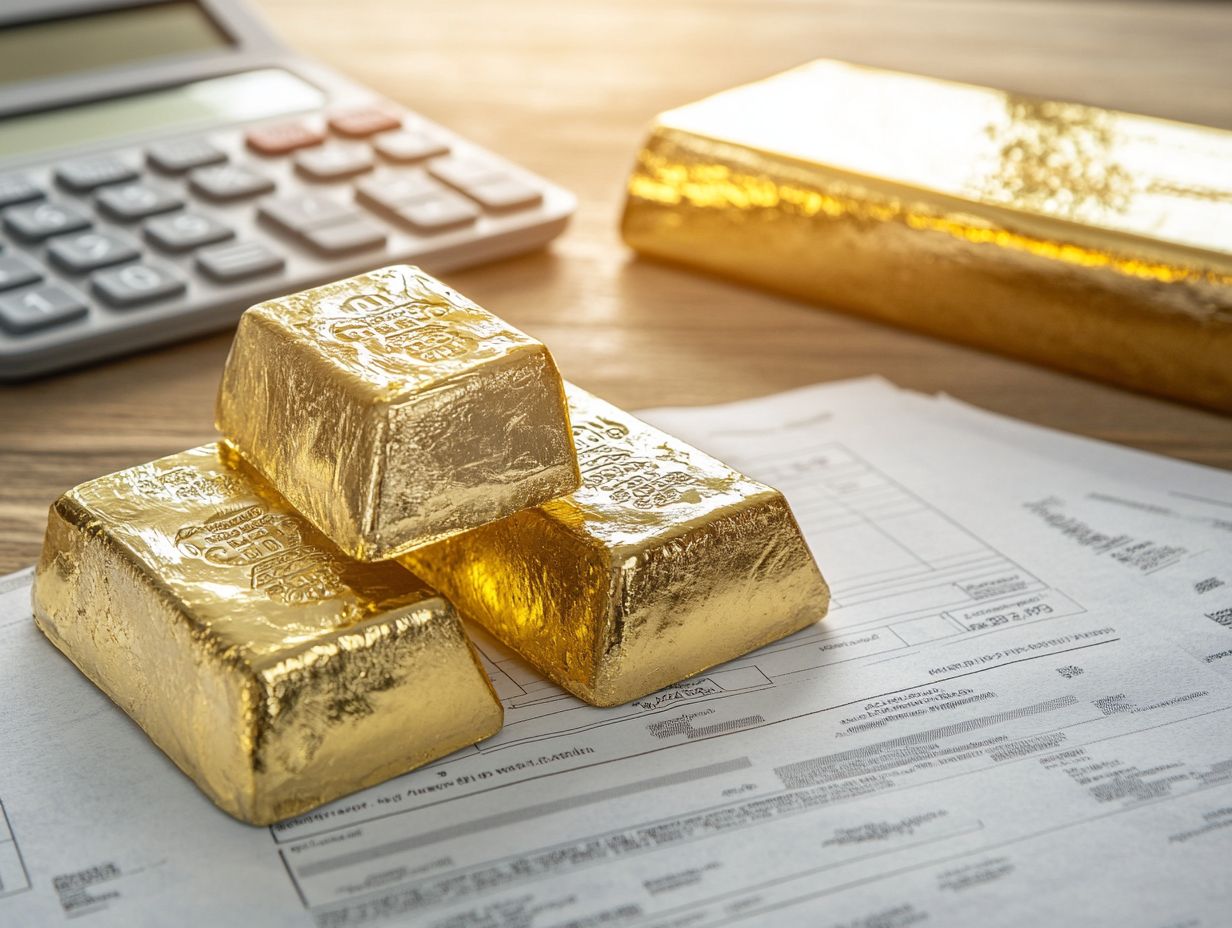
Engaging a tax professional is essential when navigating the complexities of transferring precious metals. They can provide tailored tax strategies that align with your unique financial goals.
These specialists understand the tax regulations for precious metals in retirement accounts, allowing them to pinpoint potential tax liabilities and uncover opportunities for savings. Their expertise is crucial in crafting strategies that comply with the law while minimizing your tax exposure during transfers.
By analyzing your situation, they can recommend the optimal timing and methods for transferring assets. This ensures you are well-informed about your decisions. In a constantly evolving tax landscape, having a knowledgeable guide can make all the difference, especially when it comes to understanding tax brackets for precious metals investors, in achieving favorable outcomes.
Other Considerations for Transferring Precious Metals
Beyond tax implications, consider several other critical factors when transferring precious metals. Ensure you have adequate insurance coverage to protect your valuable assets.
Understanding the reporting requirements is also important to remain compliant and informed throughout the process. Maintaining meticulous record-keeping provides clarity and accountability.
Insurance Coverage
Insurance coverage for precious metals is vital to shield your investment from loss, theft, or damage. This ensures that your assets remain secure, especially during transfers.
Given the high value of gold, silver, and other precious metals, having a dedicated policy can grant you peace of mind. Various types of insurance, including comprehensive and specialized coverage, address different needs, such as market fluctuations and safe storage.
Make sure you have adequate coverage when transporting these valuable items, as the risk of loss can significantly increase during transit. When selecting the right policy, evaluate your specific requirements, compare different providers, and consider additional benefits, such as coverage for natural disasters, to effectively safeguard your assets.
Record-Keeping and Reporting Requirements
Maintaining meticulous record-keeping is essential when transferring precious metals. This practice ensures compliance with Internal Revenue Service (IRS) reporting requirements and helps track your tax obligations.
Accurate documentation serves as a crucial safeguard, allowing you to substantiate your transactions during audits or reviews. Keep records of purchase and sale invoices, receipts, and any pertinent correspondence.
By noting the dates of transactions, the parties involved, and the specific types of metals exchanged, you can create a clear trail that protects against potential discrepancies. Given the complexity of tax laws surrounding precious metals, organized records simplify the reporting process and help you navigate intricate IRS regulations. For a deeper insight, refer to understanding luxury taxes on precious metals, ensuring nothing slips through the cracks when it’s time to file your taxes.
Frequently Asked Questions
What are the tax implications of transferring precious metals?
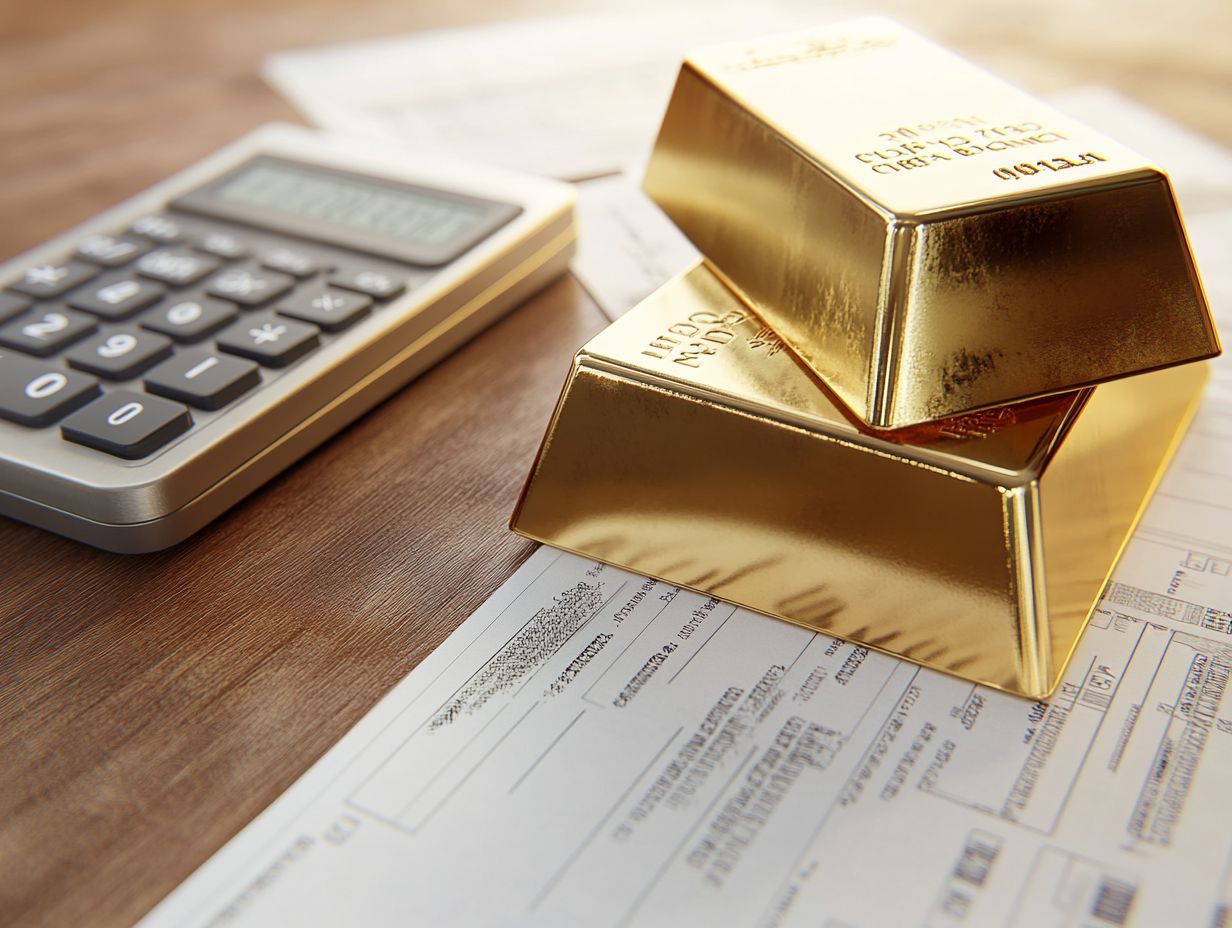
Transferring precious metals can have tax implications based on the type of metal and its value. Consult a tax professional for personalized advice.
Do I have to pay taxes when transferring precious metals to another person?
Yes, you may need to pay taxes when transferring precious metals. This could be a capital gains tax or a gift tax, depending on your situation. Always seek professional tax advice.
Are there any exemptions for transferring precious metals without incurring taxes?
Some exemptions allow tax-free transfers of precious metals, like gifting to a spouse or donating to charity. Research these options before you make a transfer.
Do I need to report the transfer of precious metals on my tax return?
Yes, you usually need to report precious metals transfers on your tax return. Not reporting can lead to penalties.
What happens if I transfer precious metals internationally?
International transfers of precious metals can involve extra taxes, such as customs duties and VAT. Make sure you understand the tax laws of both countries before proceeding.
Can I transfer precious metals into a retirement account without incurring taxes?
Yes, you can transfer precious metals into a retirement account without incurring taxes if done through a qualified trustee. Be aware of potential fees, and consult a financial advisor for advice.










